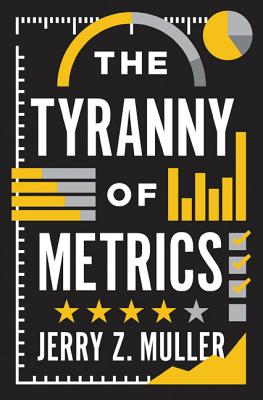數字災難–量化評鑑如何威脅教育、醫療系統與企業、政府的運作
當成績決定學生的素質,績效考核決定員工的產值,醫療評鑑決定醫師的品質,所有事物的意義均量化成數字與圖表時,人的價值將逐漸散逸在數值的競逐之中。
古希臘哲學家畢達哥拉斯曾說:「人是萬物的尺度」,如今人類面對無止境的測試與量化,反倒成為萬物中被丈量最甚的物種。科技日益進步的今日,各種規模的組織都透過蒐集與分析數據來量化人的表現,並作為獎賞與懲罰的依據。原本量化是為了提高生產力、改進不足的空間而出現的工具,如今人們只追逐表面的數據而忽略的原本的意義。量化因此沒有改善人們的生活,反而威脅到了生活中的各個層面。The Tyranny of Metrics解析人們過度依賴量化評鑑帶來的各種災害,並探討如何能扭轉情勢。
本書援引教育、醫療、金融與企業、政府、警察與軍隊、慈善機構與外援等案例,說明為何量化評鑑的指標常常扭曲真相,或使人們窮忙於美化數據。若教師為了學校存續,僅聚焦升學考試內容而非教導學生更重要的待人處事之道;若醫院過於在乎手術成功率,重症病患就容易被拒於門外;若將數字擺在第一順位,人們將無法真正關注到需要聚焦的事物。數據僅僅是輔佐判斷的工具,並非替代人們的個人經驗。本書末提供數據判讀的時機與方式,對於過度依賴數字的現代人提供及時的糾正與建議。
作者傑瑞.穆勒(Jerry Z. Muller)為美國華盛頓天主教大學歷史學教授。著作涵蓋歷史、社會科學、哲學、公共政策等面向。其中《市場與大師》(The Mind and the Market: Capitalism in Modern European Thought)被歷史學會授予Donald Kagan最佳歐洲歷史獎。除了前五本著作外,他的文章刊登於《外交》《新共和》《泰晤士報文學增刊》《華爾街日報》與德國雜誌《Merkur》《商報》。
「在The Tyranny of Metrics中,傑瑞.穆勒真實的再現了以數字評估的各種方式造成危害的表現:在我們的學校、大學、醫院、軍隊以及商業中。本書解決了一個重大的問題。」–喬治.艾克羅夫(George A. Akerlof),2001年諾貝爾經濟學獎得主
(文/博客來編譯)
How the obsession with quantifying human performance threatens our schools, medical care, businesses, and government
Today, organizations of all kinds are ruled by the belief that the path to success is quantifying human performance, publicizing the results, and dividing up the rewards based on the numbers. But in our zeal to instill the evaluation process with scientific rigor, we've gone from measuring performance to fixating on measuring itself. The result is a tyranny of metrics that threatens the quality of our lives and most important institutions. In this timely and powerful book, Jerry Muller uncovers the damage our obsession with metrics is causing--and shows how we can begin to fix the problem.
Filled with examples from education, medicine, business and finance, government, the police and military, and philanthropy and foreign aid, this brief and accessible book explains why the seemingly irresistible pressure to quantify performance distorts and distracts, whether by encouraging "gaming the stats" or "teaching to the test." That's because what can and does get measured is not always worth measuring, may not be what we really want to know, and may draw effort away from the things we care about. Along the way, we learn why paying for measured performance doesn't work, why surgical scorecards may increase deaths, and much more. But metrics can be good when used as a complement to―rather than a replacement for―judgment based on personal experience, and Muller also gives examples of when metrics have been beneficial.
Complete with a checklist of when and how to use metrics, The Tyranny of Metricsis an essential corrective to a rarely questioned trend that increasingly affects us all.
Review
"For every quantification, there's a way of gaming it. So argues this timely manifesto against measured accountability."--Kirkus Reviews
"In this clear and compelling book, Jerry Muller shows how our attempts to improve organizational outcomes through quantitative measures have metastasized into a culture of gaming and manipulation. Through carefully researched case studies on education, healthcare, and compensation, The Tyranny of Metrics makes a convincing case that we need to restore judgment and ethical considerations at a time when shallow quantification threatens the integrity of our most important institutions."--Rakesh Khurana, Harvard Business School
"Have you ever wondered why universities make the mistake of hiring presidents with little or no experience in higher education, or why, nine times out of ten, these foreign imports fail? Then read Jerry Muller's new book and you will understand such folly as one more instance of an unhappy, massive trend--abandoning the situated judgment of experienced professionals in favor of the supposedly objective judgment promised (but not delivered) by the magic bullet of metrics: standardized measures and huge data banks touted as generating insight and wisdom all by themselves. Muller dismantles this myth in a brisk and no-nonsense prose that has this reader crying ‘yes, yes' at every sentence."--Stanley Fish, author of Winning Arguments and Think Again
"Quantification, once only a tool, has become a cult. I can think of no better deprogrammer than Jerry Muller, whose renowned skills in dissecting political and social doctrines are evident here. The Tyranny of Metrics should be essential reading for managers and the managed alike."--Edward Tenner, author of The Efficiency Paradox: What Big Data Can't Do and Why Things Bite Back: Technology and the Revenge of Unintended Consequences
"In The Tyranny of Metrics, Jerry Muller has brought to life the many ways in which numerical evaluations result in deleterious performance: in our schools, our universities, our hospitals, our military, and our businesses. This book addresses a major problem."--George A. Akerlof, Nobel Prize–winning economist
"The Tyranny of Metrics is an important and accessible book about a growing problem. It comes as close as anything I've read to showing us how to break out of the dysfunctional cycle of measuring, finding out that measuring doesn't get us where we want to go, but then measuring some more."--David Chinitz, School of Public Health, Hebrew University Hadassah Medical School
"Broad in scope and ambition, persuasively argued, and engagingly written, The Tyranny of Metrics is a very compelling book."--Mark Schlesinger, Yale University
| FindBook |
有 1 項符合
The Tyranny of Metrics的圖書 |
 |
The Tyranny of Metrics 作者:Jerry Z.,Muller 出版社:Princeton Univ Pr 出版日期:2018-02-06 語言:英文 規格:精裝 / 14 x 21.6 cm / 普通級 |
| 圖書館借閱 |
| 國家圖書館 | 全國圖書書目資訊網 | 國立公共資訊圖書館 | 電子書服務平台 | MetaCat 跨館整合查詢 |
| 臺北市立圖書館 | 新北市立圖書館 | 基隆市公共圖書館 | 桃園市立圖書館 | 新竹縣公共圖書館 |
| 苗栗縣立圖書館 | 臺中市立圖書館 | 彰化縣公共圖書館 | 南投縣文化局 | 雲林縣公共圖書館 |
| 嘉義縣圖書館 | 臺南市立圖書館 | 高雄市立圖書館 | 屏東縣公共圖書館 | 宜蘭縣公共圖書館 |
| 花蓮縣文化局 | 臺東縣文化處 |
|
|
圖書介紹 - 資料來源:博客來 評分:
圖書名稱:The Tyranny of Metrics
內容簡介
|









